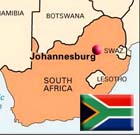Fasting for Zimbabwe: South Africans start to mobilize
 Johannesburg - The plight of Zimbabwe's growing legions of starving people moved a group of senior public figures in neighbouring South Africa, including Nobel peace laureate Archbishop Desmond Tutu, to begin a three-month rolling fast and hunger strike Wednesday.
Johannesburg - The plight of Zimbabwe's growing legions of starving people moved a group of senior public figures in neighbouring South Africa, including Nobel peace laureate Archbishop Desmond Tutu, to begin a three-month rolling fast and hunger strike Wednesday.
Around half of Zimbabwe's population, estimated at 11 million, can no longer feed itself, as food production tracks the country's economic collapse. Growing numbers of hunger-related deaths, particularly in rural areas, are being reported.
To underscore the urgency for a solution to the crisis, Tutu and a number of other religious and civic leaders will go without food, either one day a week in the bishop's case, or, in the case of social activist Kumi Naidoo, for a full 21 days.
Speaking at the launch of the campaign, Mozambican activist, Graca Machel, Mozambique's former first lady and a member of The Elders brains trust, said the people of southern Africa could no longer wait for their leaders to solve Zimbabwe's problems.
"We stood and waited for too long ... ," she said.
Estimating the number of Zimbabweans who have died needlessly under President Robert Mugabe's rule in the hundreds of thousands, the popular Machel, who is also Nelson Mandela's wife, declared: "Enough is enough."
The leaders of the 15-country Southern African Development Community (SADC) who have been criticized for their kid-gloves approach to the tyrannical Mugabe, had to "take responsibility," she said. "We lay these lives (the lives of Zimbabweans) in their hands."
The campaign kick-off comes five days before SADC heads of state are due to hold a crisis summit on Zimbabwe's political stalemate - the third such summit in under a year.
Mugabe signed an agreement in September to form a unity government with the opposition but the deal has become bogged down in wrangling over positions of power.
Machel said political egos were to blame for the impasse and called for the negotiations to be widened to include "other voices", apparently referring to civil society, which has been at the forefront of the pro-democracy movement in Zimbabwe but been excluded from the talks.
Asked whether she supported calls by Tutu and other African and world leaders for Mugabe to step down, Machel, who was barred from visiting Zimbabwe recently on a fact-finding mission with other Elders, said: "The people of Zimbabwe have already said so."
"The ballot has spoken," she said, referring to Mugabe's drubbing in last year's elections.
Others were more direct. "Let us ask God to bring down the regime of Robert Mugabe," the head of the outspoken South African Council of Churches, Tinyiko Maluleke said.
The campaign, entitled Save Zimbabwe Now, was launched in Johannesburg's Central Methodist Church, which harbours thousands of Zimbabweans, mostly illegal immigrants who jumped the border in search of work to feed their families.
Apart from fasts and hunger strikes, the organizers also plan to mobilize solidarity for Zimbabwe with a series of protest marches.
Until now, handwringing - and speculation over whether the same could happen at home - has characterized the reaction of South Africans to Zimbabwe's slide into violence and despair, even as the death toll from cholera, hunger and disease rapidly mounts.
"Silence in this context is complicity. Inaction in this context is collaboration," Naidoo told around 200 journalists, activists and Zimbabwean migrants who packed the church's pews.
A day after US President Barack Obama's inauguration, his remarks on Tuesday about despotic leaders who found themselves on the "wrong side of history" was interpreted as a direct hit on Mugabe.
"I think this was directed to the president of Zimbabwe," one activist mused. (dpa)